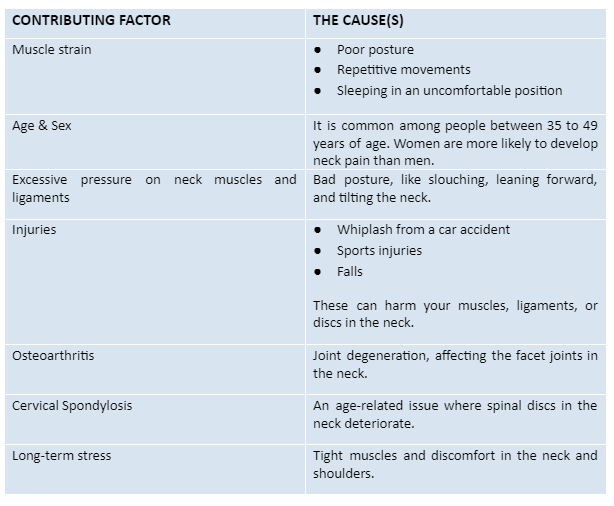
Listen to article
Loading audio...
Neck pain, medically termed cervicalgia, is a common problem that can significantly disrupt our daily activities. It can range from mild discomfort to a serious condition. It can limit our ability to move and cause discomfort. Understanding the reasons for neck pain is the first step toward relief from neck pain and preventive measures.
Synopsis
Why is Our Neck Prone to Pain?
Our neck is a complex body structure. It offers head support and allows for various movements. It includes the backbone, muscles, ligaments, nerves, and spinal cord. This intricate system enables flexibility but also makes it vulnerable to damage and stress.
Key Causes of Neck Pain

All the factors explained above cause stiffness, swelling, and even nerve compression in the neck.
Additional reasons for neck discomfort include:
-
Fibromyalgia
-
Meningitis
-
The presence of a tumour in the spine or nearby tissues
Discussing your neck pain condition with an experienced Ortho doctor in Salem can help you understand the potential cause(s) behind it.
Identifying the Symptoms of Neck Pain
There are different ways in which neck pain can appear. Listed below are a few typical indicators to be mindful of:
-
Pain or tightness in the neck
-
Trouble rotating the head
-
Headaches, specifically at the bottom of the head
-
Pain in the shoulders or arms
-
Numbness or tingling sensation in the arms or hands
-
Lack of strength in the arms or hands
Experiencing these signs consistently warrants a visit to a specialised orthopaedician to get neck pain treatment as early as possible. Visit a top spine hospital in Salem for the best treatment and care for neck pain or other spine issues.
How to Avoid Neck Pain: Easy Ways for a Life without Discomfort
To identify what is causing your neck pain, the doctor will review your medical history and conduct a physical exam to make sure there are no underlying conditions associated, like pressure on your spinal cord (compression) or cancer
Include these simple tips in your every day for neck pain relief:
-
Maintain proper posture: Maintain an upright position with shoulders back and ears in line with them. Make sure your computer monitor is positioned at eye level if you are working at a desk.
-
Take frequent breaks: Stand up and walk around at every half an hour or 45-minute intervals. This prevents tension in your neck muscles caused by prolonged sitting in one position.
-
Utilise proper ergonomics: Purchase a supportive, comfortable chair with good lower back support for your office work.
-
Make sure to stretch frequently: Gentle neck stretches and neck muscle exercises can make you more flexible and reduce muscle tightness. It also helps in better spine support.
-
Control stress: Relieve muscle tension caused by stress by relaxation methods like yoga or meditation.
-
Keep a healthy weight: Having too much weight can cause extra pressure on your neck and spine.
-
Good sleep position: Avoid sleeping on your stomach as it can strain the neck muscles. Instead, try to sleep on your back or side.
Adhering to these simple ways can greatly help you maintain a healthy and pain-free neck. Please note that a prompt diagnosis and treatment are essential for a quick recovery. If your neck pain is severe or does not get better with these preventive measures, seek advice from our top orthopaedic specialists at Manipal Hospital Salem for the best course of treatment.
FAQ's
Not all neck pain is a serious concern. Poor posture or doing the same motion repeatedly often leads to muscle strain. This can be corrected with posture management, exercise, and over-the-counter medications. However, you must seek medical attention if your neck pain becomes severe or worsens and it is associated with fever, numbness, or weakness as this may indicate any potential underlying condition.
As an office worker, you can make various postural changes to avoid neck pain. Keep your shoulders back and your monitor at eye level. Take frequent breaks – just stand up and walk around for 5-10 min every hour. Additionally, practice gentle neck stretches in your daily exercise routine.
To avoid neck pain, sleep on your back or either side. Use a comfortable pillow that can support proper neck alignment. Sleeping on your stomach is not advisable as it can cause tension in your neck muscles.



















 5 Min Read
5 Min Read




.png)








